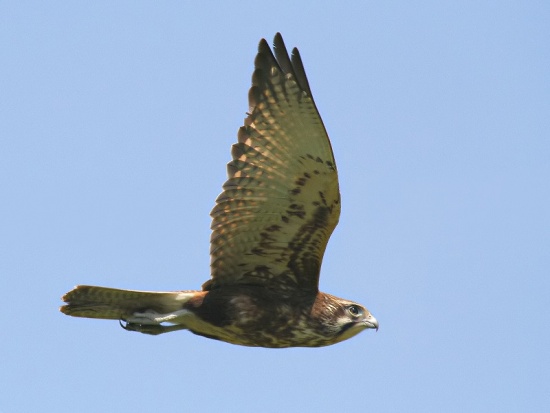| Line 1: | Line 1: | ||
| + | [[Image:Brown_Falcon.jpg|thumb|550px|right|Photographed in Adelaide, S.A. by Mitcon]] | ||
;[[:Category:Falco|Falco]] berigora | ;[[:Category:Falco|Falco]] berigora | ||
| − | + | ||
==Identification== | ==Identification== | ||
| + | 41-50cm. Dark brown upperparts, cream underparts, brown sides to head, tear-stripe below the eye, barred tails. | ||
==Distribution== | ==Distribution== | ||
| − | [[Australasia]]: occurs over most of the continent although scarcer on the east coast. Also found on Tasmania and in southern and eastern [[New Guinea]]. Resident or nomadic. | + | [[Australasia]]: occurs over most of the continent although scarcer on the east coast. Also found on [[Tasmania]] and in southern and eastern [[New Guinea]]. Resident or nomadic. |
==Taxonomy== | ==Taxonomy== | ||
Four races are recognised: ''novaeguineae'' in New Guinea, ''berigora'' in the more humid parts of Australia, ''centralia'' in the dry interior of Australia and ''tasmanica'' on Tasmania. | Four races are recognised: ''novaeguineae'' in New Guinea, ''berigora'' in the more humid parts of Australia, ''centralia'' in the dry interior of Australia and ''tasmanica'' on Tasmania. | ||
==Habitat== | ==Habitat== | ||
Open woodland and forest edge, plains, grasslands and farmland. | Open woodland and forest edge, plains, grasslands and farmland. | ||
| + | ==Behaviour== | ||
| + | The diet includes small mammals, insects, and reptiles. | ||
| + | |||
| + | The nest is made from sticks. 2-6 eggs are laid and are incubated by both sexes for 30 days. The young fledge after a further 40-45 days. | ||
| + | |||
==External Links== | ==External Links== | ||
{{GSearch|Falco+berigora}} | {{GSearch|Falco+berigora}} | ||
*[http://www.aviceda.org/abid/birdimages.php?action=birdspecies&fid=43&bid=596 View more images of this species on the ABID] | *[http://www.aviceda.org/abid/birdimages.php?action=birdspecies&fid=43&bid=596 View more images of this species on the ABID] | ||
| − | [[Category:Birds]][[Category:Falco | + | [[Category:Birds]][[Category:Falco]] |
Revision as of 15:53, 17 December 2008
- Falco berigora
Identification
41-50cm. Dark brown upperparts, cream underparts, brown sides to head, tear-stripe below the eye, barred tails.
Distribution
Australasia: occurs over most of the continent although scarcer on the east coast. Also found on Tasmania and in southern and eastern New Guinea. Resident or nomadic.
Taxonomy
Four races are recognised: novaeguineae in New Guinea, berigora in the more humid parts of Australia, centralia in the dry interior of Australia and tasmanica on Tasmania.
Habitat
Open woodland and forest edge, plains, grasslands and farmland.
Behaviour
The diet includes small mammals, insects, and reptiles.
The nest is made from sticks. 2-6 eggs are laid and are incubated by both sexes for 30 days. The young fledge after a further 40-45 days.




